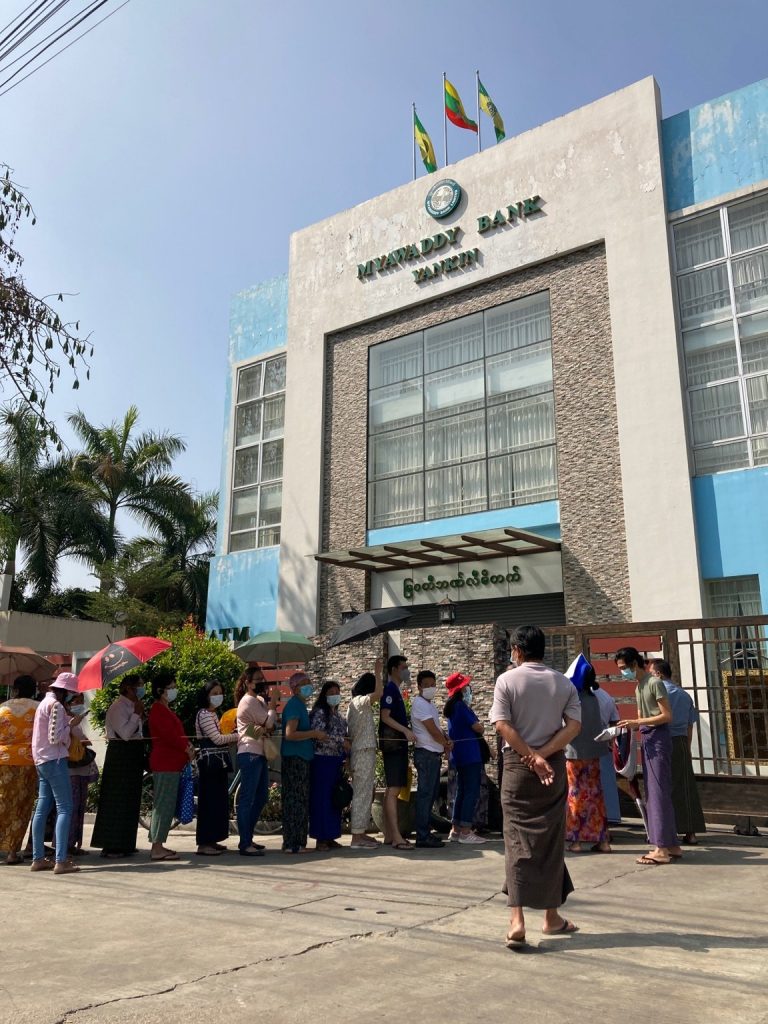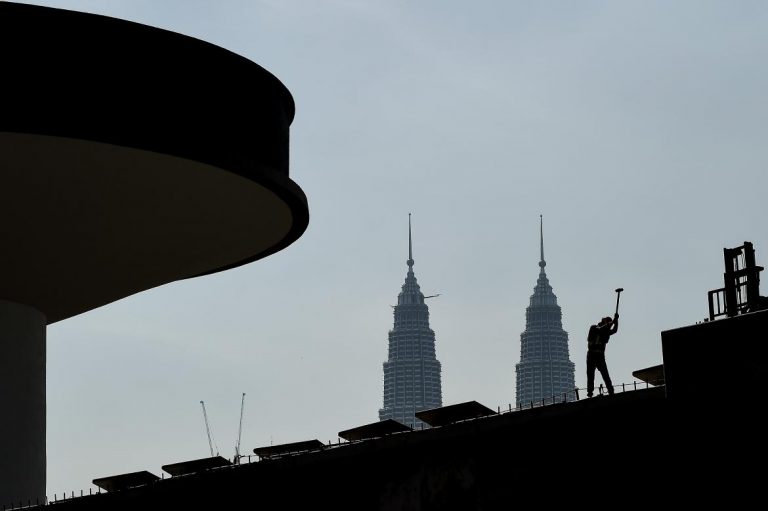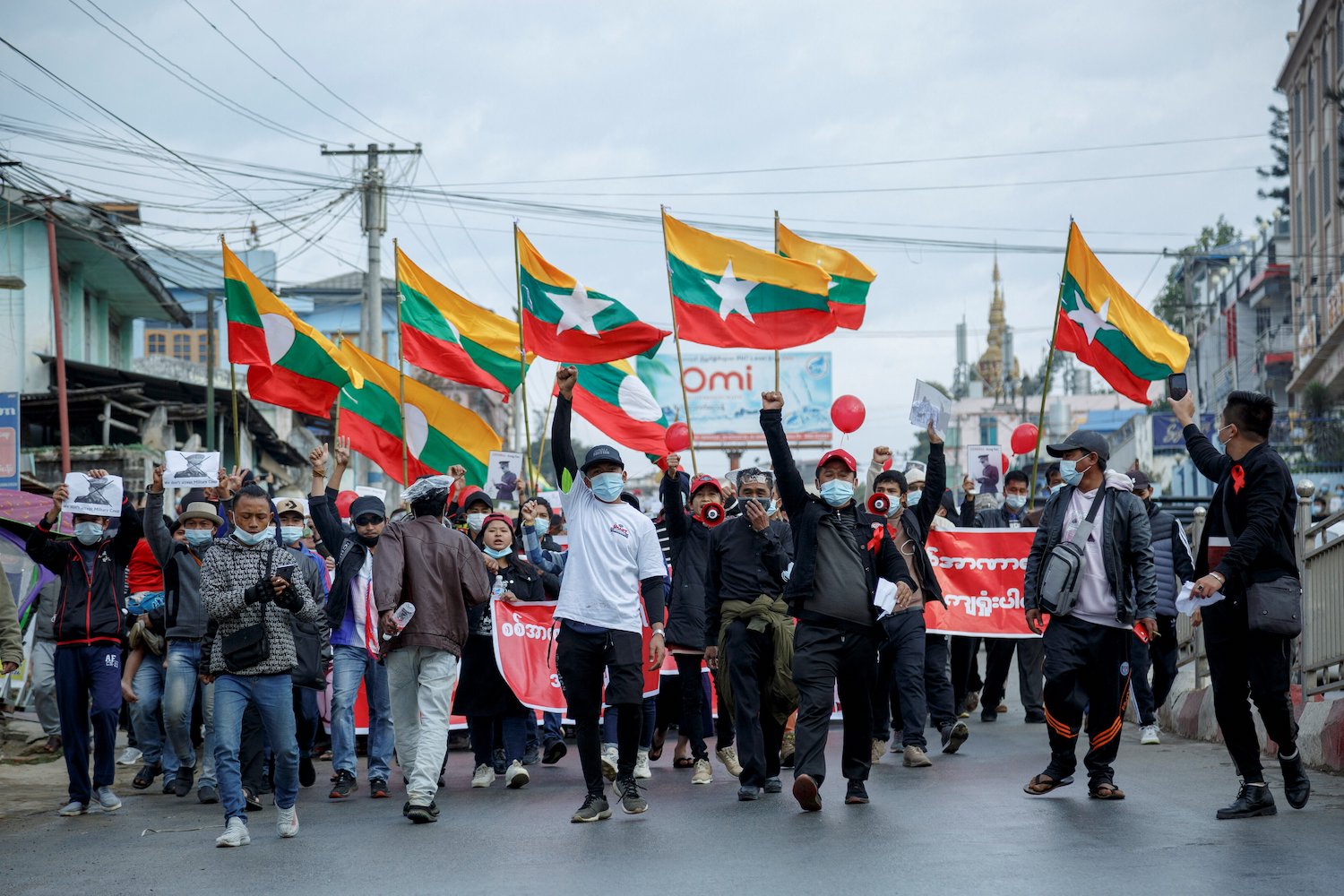As the military-owned Myawaddy Bank suspends operations following a run on withdrawals, government retirees worry their next pension payments from state-owned Myanma Economic Bank won’t come.
By FRONTIER
At 7:30am on February 22, Daw Aye Myint queued outside a branch of the state-owned Myanma Economic Bank in Mawlamyine, the Mon State capital. A retired senior assistant teacher, she was on a mission to collect her government pension.
The 72-year-old, who retired in 2008, usually collects her pension at the end of the month, but an announcement on the 8pm news on February 21 said pensions could be drawn the following day. The next morning, she left for the bank as early as she could.
When she arrived, Aye Myint was surprised by the size of the crowd waiting to get in. Nearly everyone there was a pensioner reacting to the same announcement she’d heard on TV the previous evening.
After the Tatmadaw seized power on February 1, public servants opposed to the coup have gone on strike as part of a Civil Disobedience Movement that has attracted broad support throughout the nation. These include employees of the four state-owned banks – the Myanma Foreign Trade Bank, Myanma Investment and Commerical Bank, Myanma Agriculture and Development Bank and MEB – leading all four to announce temporary service limits. As the CDM moves to private businesses in sectors seen as strategic for the junta, private banks have also suspended services, prompting branches in major urban areas to close and ATMs to run out of money.
A run on withdrawals at the military-owned Myawaddy Bank forced it twice to impose restrictions: on February 16 it limited services at branches to no more than 200 customers a day, with a K5-million maximum placed on withdrawals, and on February 18 it further restricted branch services to 100 customers a day and withdrawals to K1-million. Then, on February 23, it suspended withdrawals altogether until the end of the month.
Aye Myint said she had been confident she’d be able to withdraw her pension on February 22 from MEB because the military government had said she’d be able to. “Once they make an announcement, they will do it by any means,” she told Frontier outside the bank that morning. “But, just to make sure, I came early.”
Still, despite her cautiously early arrival, her queue token was already No. 102, which gave her some doubt.
“I’m worried there won’t be any money left when I get served,” she said.
The bank opened at 9am. After patiently queueing for more than eight hours, Aye Myint was finally served at about 4pm – an hour later than the bank normally closes. It had to extend its hours to serve all those who had shown up.
Aye Myint filled out a withdrawal slip for four months’ pension, but the teller told her she could withdraw only two months’ worth. The rest, she was told, couldn’t be withdrawn until the end of the month. Most pensioners have accumulated several months’ worth of payments but the bank does not keep this entire amount on hand, so pensioners can only take out a portion at a time, she was told.
That same day, at the MEB branch near Sule Pagoda in downtown Yangon, Daw Khin Thida, 62, had a similar experience. When she arrived at 10am, her queue token was past No. 300.
“People are being told they can withdraw no more than one month’s pension,” she said. “Nobody can get more than that.”
She told Frontier that, as the queue eked along, she asked a security guard what was taking so long. He told her that, because so many employees had joined the CDM, the bank was short-staffed. In fact, he said, three or four of the tellers working that day had also initially joined the movement, but senior bank officers pressured them to return to process pensioner withdrawals.
“They came to work for the pensioners,” Khin Thida quoted the guard as saying.
There are more than 900,000 pensioners in Myanmar, according to reporting from 7Day.
An MEB clerk at the Mawlamyine branch who gave her name as Ma Khine told Frontier she wants to join the CDM and fears facing criticism from those in the movement, but that “I have to work for my living”.
“I’m afraid of losing my job. Now some senior officials are warning staff that have joined … and some were even arrested,” she said.
Demonstrators have been regularly gathering in front of banks to encourage employees to join the CDM, leading the junta to issue a statement through state media on February 21 telling people not to protest in front of MEB branches while pensioners are trying to withdraw money. Some employees that are still working or have returned are showing up in street clothes instead of bank attire – including Khine, the clerk in Malwlamyine.
Khin Thida said the guard she spoke to also told her that cash reserves at the Yangon branch were “nearly exhausted”, and when she finally received her pension, at around 4:30pm, she overheard tellers saying the reserves would only last another three or four days.
“I worry about whether older pensioners will be able to receive their payments,” she said. “At the moment, it’s not certain that I’ll receive mine next month.”
Mobile money services seem to also have taken a hit due to a growing shortage of cash in the economy. U Khin Maung Soe, a retired primary school principal from Yangon’s Pabedan Township, said retired friends of his have tried to use the Wave Money app to receive their pensions, but that “it does not work”.
“The problem is that no Wave Money agent will issue hundreds of thousands of kyat these days. They say they have no money,” he said. “People’s pensions are in the Wave Money app, but they can’t withdraw it in cash!”
“Going to the bank should be an easy way to get money. But when I went to the bank I faced troubles all day and became exhausted,” he said. “Some friends that couldn’t get it one day had to return and try the next day.”
Meanwhile, state media continues to report that pension withdrawals are going smoothly and quickly, making no mention of the difficulties Frontier observed.
“Branches of Myanmar Economic Bank is giving out retirement pension for civil service personnel at its branches in respective regions and states, commencing on February 22,” ran an announcement in the state-run Global New Light of Myanmar on February 23.







